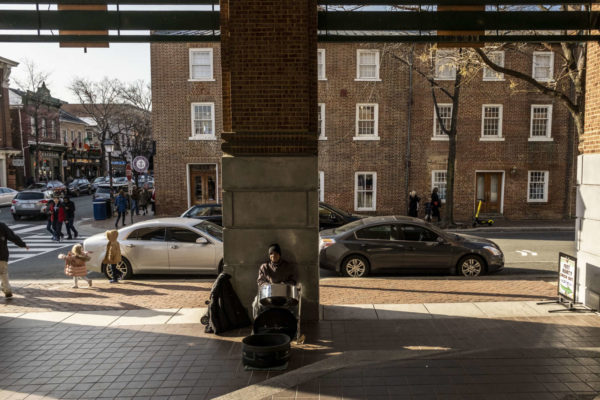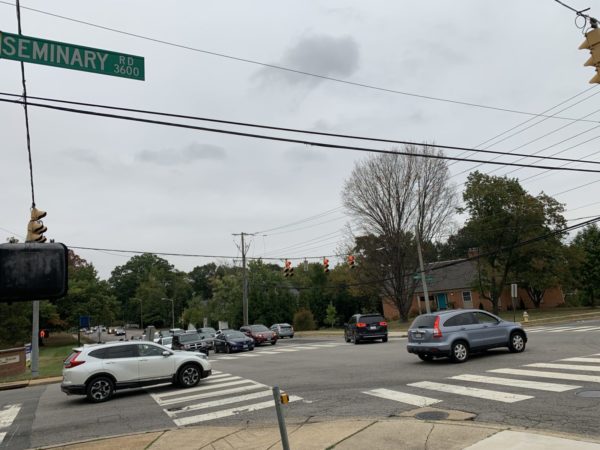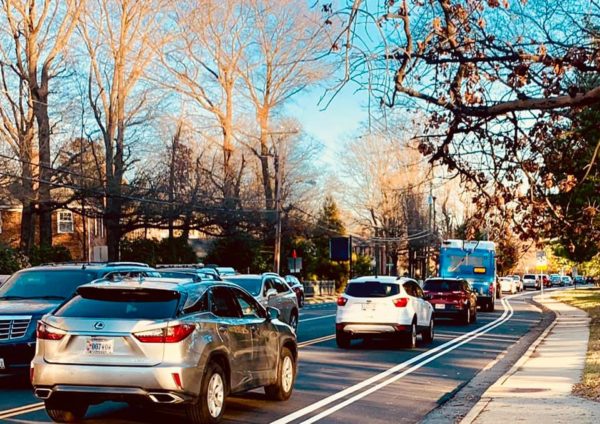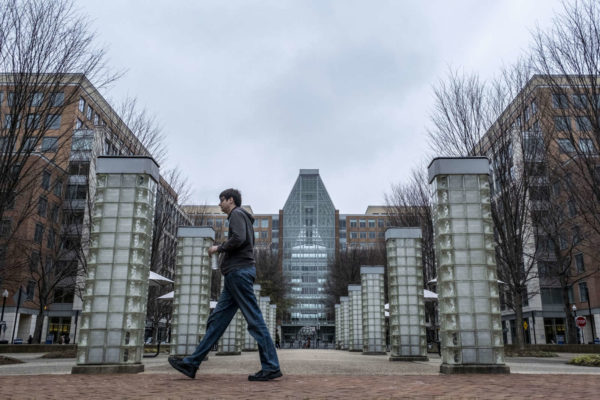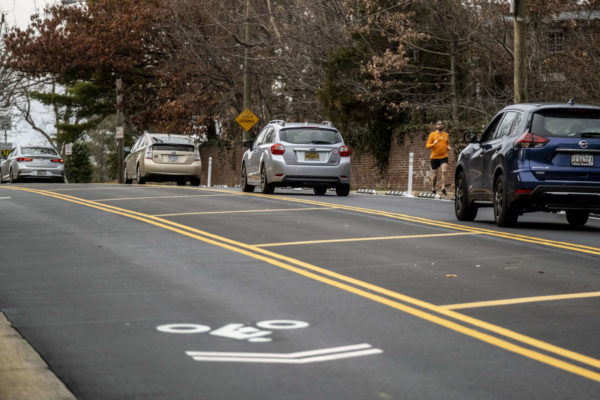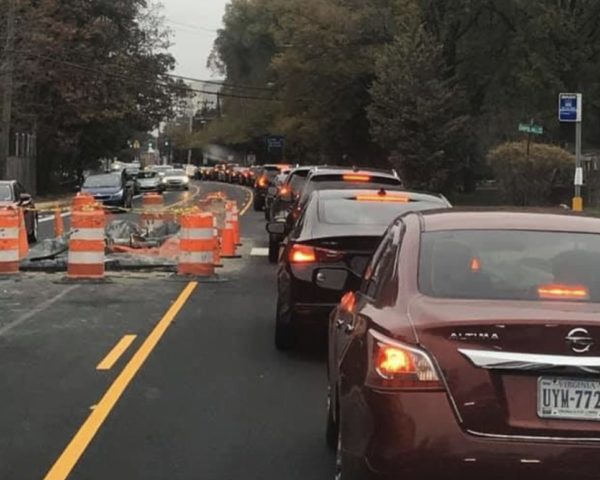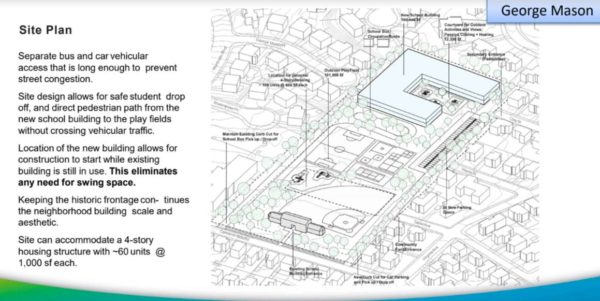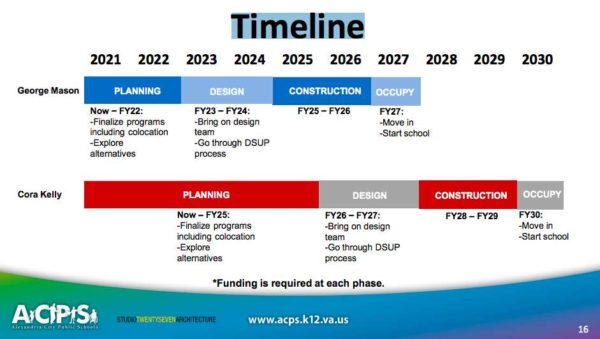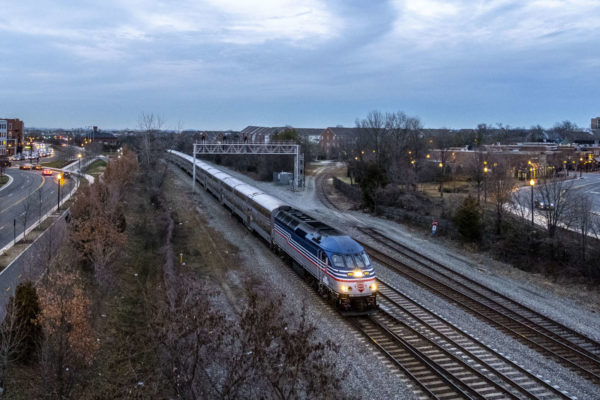Old Town Theater Sign May Be Removed — “The Board of Architectural Review is set to consider allowing the removal and relocation of the Old Town Theater sign and other exterior changes as the space is set to become a Patagonia retail store. The meeting will be held at 7 p.m. Wednesday in Council Chamber at Alexandria City Hall.” [Patch]
APD Investigates Gunshots in Landmark — “The Alexandria Police Department is investigating a ‘shots fired’ call for service in the 200 block of South Whiting Street. Expect police activity in the area.” [Twitter]
‘Normal Weekday’ on Seminary Road — Has the Seminary Road Diet produced a rush hour traffic nightmare, as some insist? Or is it just producing modest peak period delays, as data seems to show? Video posted by a local cycling advocate, shot shortly after 8 a.m. on a recent weekday, shows free-flowing traffic and no delays, though photos posted by road diet critics show backups at intersections. [Twitter, YouTube]
Students Write, Perform Play at Kennedy Center — “Two talented eighth grade students from George Washington Middle School had the experience of a lifetime when they wrote and performed in a play at the John F. Kennedy Center for the Performing Arts earlier this month. Yahney-Marie Sangare and Sydney Payne were part of a team of young playwrights and actors who produced The Day Nothing Happened, a play about the desegregation of Stratford Middle School in Arlington.” [ACPS]
After months of activism over the much-maligned Seminary Road Diet, the Facebook group dedicated to opposing the lane reduction has rebranded itself and broadened its focus.
On Sunday, the Alexandria Residents Against the Seminary Road Diet Facebook group was renamed “Bring Integrity Back to Alexandria! End Seminary Rd Diet & Other Bad Ideas.”
“I think that trust in the city government has reached a low ebb. It’s the lowest that it’s been in the 30 years that I’ve lived in Alexandria,” said Bill Rossello, one of the administrators of the Facebook group. “When the city makes a decision, they just go through the motions to make it look like they are making efforts toward civic engagement.”
The group of around 1,500 vocal residents was founded in November — not long after the quick implementation of the road diet, a reduction of the 0.9 mile stretch of Seminary from N. Quaker Lane to Howard Street from four lanes to two, plus a center turn lane and bike lanes.
After Freedom of Information Act disclosures and continuous engagements with numerous city officials, City Councilwoman Amy Jackson surprised her colleagues in December by calling for a reversal of the road diet. Jackson ended up withdrawing her motion, although the group considers the attempted action a victory.
“It’s all about Facebook and the power of social media, because all these people came to us. With 1,500 people, word can spread very quickly,” Rossello said, adding that the road diet will be an election issue in the upcoming local Democratic primary in June 2021. “There will be more FOIAs, and judging from what Amy Jackson promised to do, there will be some movement on this… I imagine that most of our members will support candidates who want to reverse it.”
Now the group will focus its attention to issues across the city. Its description on Facebook now reads:
(T)he City’s lack of truthfulness and transparency has become a pattern across a number of policy decisions and proposals, including those related to road diets, Metro entrances, affordable housing, VDOT grants and business permitting without proper data, justification and approval from actual citizens of the City.
Rossello, who served on the city’s Budget and Fiscal Affairs Advisory Committee for seven years in the 1990s, said that the private Facebook group is nonpartisan, but it is not intended to be a debate platform for city residents. About 19 members of the group have been kicked out for arguing, he noted, because the group is intended to be an “affinity group.”
A recent post emphasizes that discontentment among residents bridges the party divide.
“I like adding Bring Integrity Back to Alexandria to our name,” a group member wrote last night. “It helps combat the folks saying we’re grouchy right wingers. I, for one, am a liberal Democrat.”
“I think that we on this site want to prevent our pleasant, tree-lined City from turning into sterile, treeless Crystal City,” the post continued. “We favor a transportation department that promotes traffic flow, not traffic jams. We want our government to return to its friendly, honest, responsive ways. We want to end this era of… rigged community ‘input.'”
(Though the group is vocal in its opposition to the Seminary Road Diet, a less vocal group of residents, including many of those who live along the affected stretch of Seminary Road, support the changes. Also, it should be noted, Crystal City is not without trees.)
Despite the prohibition on arguing, Mayor Justin Wilson repeatedly engages on the page by making comments, many of which refute accusations of a conspiracy against city residents.
The mayor’s comments have fueled the determination of the group, Rossello said.
“I think that he [Wilson] has certainly added to the interest in the group and spurred a lot of discussions. People take advantage of that and spar with him,” Rossello said. “We are going to continue to put pressure on city officials.”
Seminary Road has experienced some delays since the city implemented the contentious “road diet” last fall, Alexandria officials acknowledged at a Tuesday night city council meeting.
After months of pressure from an extremely vocal group of city residents on Facebook, council members peppered staff with questions about the road diet — a reduction of a 0.9 mile stretch of Seminary Road between N. Quaker Lane and Howard Street from four to two lanes, plus the addition of bike lanes on both sides, a center turn lane, crosswalks and medians.
The city’s most recent traffic data shows a travel time increase of one minute for vehicles going westbound on Seminary from Quaker Lane to Jordan Street at peak travel times (8:15 a.m. and 5:15 p.m.) and a 30 second increase in the opposite direction. The data was collected with the city’s Bluetooth travel time monitoring system. On the plus side, staff said, the road is now otherwise safer for pedestrians, cyclists and drivers.
Alexandria City Councilwoman Amy Jackson called for a reversal of the road diet in December and spent more than an hour questioning city staff on Tuesday night. During her questioning, she had an aide present a slideshow of photos of traffic along Seminary Road.
“Hundreds of people took hundreds of pictures, because that’s what they’re doing because they’re sitting there,” she said. “I’m not convinced that our city government has alleviated the fears (of the public).”
City transportation planners said that the roadway might be minimally slower for drivers during peak hours, but that it is safer for pedestrians and cyclists.
“For the vast majority of the day the road is performing the same, if not better than before,” said Hillary Orr, deputy director of the city’s department of Transportation and Environmental Services. “And for those other 23 hours, it’s designed in a way that is comfortable for people who are walking, biking, using transit and driving their cars. And that’s one of the tradeoffs that we have talked about throughout this process.”
Fire Chief Corey Smedley told council that his staff was in communication with city staff as the road diet was being planned, and that fire and emergency vehicles have been un-hindered in their ability to navigate through traffic and answer service calls — assertions that run counter to the beliefs of road diet opponents, who have cited a FOIAed trove of emails as proof that fire department brass were pressured into supporting the changes.
When Jackson asked him if his department was in consultation and agreement with the plan, he responded by saying, “Absolutely.”
Police Chief Michael Brown reported that there have been three reported car crashes along the roadway since the road diet was implemented last fall, including one that occurred at the conclusion of a high speed chase by the Virginia State Police. Otherwise, he said, the road diet has presented no issues for police.
Council voted 4-3 for the road diet last October, supported by Mayor Justin Wilson, Vice Mayor Elizabeth Bennett-Parker, and council members Canek Aguirre and Del Pepper. In opposition were Jackson, and council members John T. Chapman and Mo Seifeldein.
Bill Rossello wasn’t convinced by the staff presentation. The Seminary Hill resident sat in on the meeting for more than two hours before calling it a night and walking out.
“It’s absolute horse hockey,” Rossello told ALXnow. “The city is not very good at presenting data, gathering data and what it’s really not good at is listening to the overwhelming majority of community members who actually use the road, who see it first-hand, live it every day. Not a bit.”
Wilson said he expects community activism regarding the road diet to continue.
“There are going to be differences of opinion, there are going to be things that we don’t always 100% see eye-to-eye on,” Wilson said. “I appreciate the collaboration on this and so many other matters. I want to thank the community for all of their comments on this. I’m sure they will continue, and that’s a great thing and we can continue this discussion as we move forward and evaluate this project as we committed to do from the beginning.”
But Rossello, who is an administrator of the Alexandria Residents Against the Seminary Road Diet Facebook group, said Tuesday night’s meeting didn’t sit well with him.
“What we’re seeing at the leadership levels is that there seems to be a willingness to go along with this narrative that we were all involved talking about this throughout the process, which is absolutely not true,” he said. “They know that there are more cars on the road, and narrowing roads isn’t gonna make it better. That doesn’t make our quality of life better. I don’t think anything that happened tonight increases the trust that the community has in our city government.”
Photo via Alexandria Residents Against The Seminary Road Diet/Facebook
Huge Fire South of Alexandria — “A large fire in Fairfax County destroyed an unfinished development of apartments and retail stores Saturday, shutting down traffic along Route 1 for several hours while firefighters battled the blaze and thick black smoke that could be seen for several miles.” Alexandria firefighters, along with firefighters from other nearby jurisdictions, responded to the scene as mutual aid. [Washington Post, NBC 4, Twitter]
Views of the Fire from Around the City — Smoke from the South Alex fire could be seen from around the city and beyond. Here are some of the views.
T.C. Williams Lights Trial Delayed — “The trial to determine whether Alexandria City Public Schools can add lights to T.C. Williams High School’s new football stadium has been postponed from Feb. 24 to June 8, Lars Liebeler, the attorney for the plaintiffs, said… Residents from six of the neighboring households filed an original complaint in August 2018.” [Alexandria Times]
History of the Oakland Baptist Church — “Longing for their own church, they organized themselves and built Oak Hill Baptist Church in 1888. The men would leave work on their day jobs, go directly to the building site of the church, and start working. They would continue building the church after work on the weekends week after week until the church was finished.” [Zebra]
Nicole Radshaw is all in favor of the much-maligned Seminary Road diet.
Three years ago on Halloween, the Seminary Valley resident was hit by a driver as she biked to work at a preschool on Seminary Road. Radshaw didn’t break any bones, but her bike was totaled, she spent a year in physical therapy, and saw a counselor to help deal with the trauma and anxiety of being hit by a car.
“It really sucked. I could have been a fatality. Cars were driving past as I was lying on the road,” Radshaw told ALXnow. “It took me three years to want to get back on a bike again.”
Radshaw belongs to a less vocal portion of city residents who favor the road diet, which has created consternation throughout Alexandria. Mayor Justin Wilson and city officials have acknowledged traffic delays at peak travel times since the 0.9 mile stretch of roadway between N. Quaker Lane and Howard Street was reduced from four to two lanes. Bike lanes on both sides were also added, in addition to a center turn lane, crosswalks and medians.
The city council and Department of Transportation and Environmental Services have received thousands of emails and messages against the plan. Arguments from the Alexandria Residents Against the Seminary Road Diet Facebook group even prompted Alexandria City Councilwoman Amy Jackson to call for a complete restart of the process.
Glenn Klaus lives in Rosemont, and his support of the road diet is more philosophical. He’s a cyclist and hasn’t yet biked on the new Seminary Road bike lanes, but wants to see fewer cars on city roadways.
“The city is trying to change driving behaviors and traffic patterns. People just have to deal, because ultimately I think that strategy is to their benefit,” Klaus said. “When people lose, it doesn’t mean they weren’t listened to. It just means their argument didn’t sway the decision-makers.”
Lisa Soronen lives on Fort Williams Parkway — about five blocks away from Seminary Road — and alternates between taking the bus in the morning and driving to work in the District. She walks her dog in the morning and crosses Seminary Road on foot up to six times a day, which used to be a “suicide mission,” she said. Now she says that drivers are paying more attention to the 25 mile per hour speed limit and she is no longer afraid of crossing the street.
“It’s absolutely wonderful, because if I want to cross the road I have a crosswalk,” Soronen said. “Same thing with the bus. Coming home after 5 p.m., I’d have to run across four lanes of traffic and someone might hit me. I’m really surprised that people feel so personal about it, and they have attacked me personally. I have been attacked online.”
Soronen said she has experienced delays along the roadway in the morning, and has seen emergency vehicles speed through the middle turn lane without issues . She got involved in the planning process for the roadway soon after moving into the neighborhood last April, and has corresponded with members of the city council and city staff.
“I might be delayed sometimes driving on Seminary, but it’s worth it for me for it to be safer for everyone,” she said. “The process I participated in seems open and fair. If things had gone the other way, I don’t think I would have considered that the process failed me.”
Soronen is an attorney and volunteers with the Mother of Light Center, which supports homeless Alexandrians. She said that the argument over the road diet is a waste of her time and distracts city council from its other work.
“I don’t understand the vitriol against this,” she said, calling the dispute “small and petty” and not as big of a deal as, say, poverty and homelessness in the city.
Co-locating affordable and workforce housing is off the table at Douglas MacArthur Elementary School, but it will be considered at all future schools slated for renovation.
That’s according to Alexandria City Public Schools officials and city staff who spoke to parents and community advocates at the school on Monday night.
The school board is set to vote on a concept plan for MacArthur on Thursday, Feb. 6, and Superintendent Dr. Gregory Hutchings, Jr., said that in order for the school to meet its construction timeline of opening in Jan. 2023, all discussions of co-locating housing at the school have been shelved. However, the upcoming staff presentation on MacArthur says that smaller-scale options like installing recreational programming and facilities is still being considered.
“Douglas MacArthur will not have affordable housing at this project due to the timing constraints that we need to really stick to,” Hutchings said, adding that ACPS needs to define what co-locating means on school grounds. “If it’s going to be at a school site, what would that look like? What are the outcomes we’re seeking, and what are the benefits as well as the challenges with that so that we are able to articulate that when times of discussing the projects?”
City Manager Mark Jinks also attended the MacArthur meeting, and said that the city is in the midst of an affordable housing crisis.
Co-locating services on school grounds has been done before, Jinks said, noting that William Ramsay Elementary School (5700 Sanger Ave) includes a recreation center and a nature center. Jinks has backed the idea of housing ACPS employees at schools that develop on-site housing alternatives.
“The whole idea is not new. The intent is to get the best use of our community assets,” Jinks said. “We don’t have a plethora of land to build horizontally that we would wish.”
Christine Coussens, a MacArthur parent, said Jinks’ example was a far cry from co-locating affordable housing on school grounds.
“We’re a school first,” Coussens said. “The examples that you have given are toward recreation. That supports our students. So, putting something forward, talking about co-localization and affordable housing is disingenuous to our community.”
Alexandria City Councilwoman Amy Jackson, who is also a MacArthur parent, said there has been a lack of transparency between the city and the public on the issue. Jackson is also a member of the MacArthur Modernization Design Advisory Committee.
“There hasn’t been the transparency — the communication — needed between the city and ACPS to actually say, ‘This is what we’re doing,'” Jackson told ALXnow. “There is a lack of communication and outreach in the community to get the word out. That’s it. If everybody knows what’s going on no one’s going to be frustrated, no one’s going to be annoyed, no one’s going to be upset and then be raging like the rest of the parents here at MacArthur.”
Big things have small beginnings, and on Wednesday night a number of Alexandria residents critical of the Seminary Road Diet — including a former mayor — took their concerns to Ramparts Tavern and Grill.
Architect Tom Hoffman has lived near the affected area for 20 years, during which time he has taken Seminary Road to get on I-395 northbound to the District. That routine has changed, he said, since the implementation of the road diet — reducing the four through lanes of the roadway to two and adding bike lanes and a turn lane in the center.
“I have taken to using Quaker Lane to get myself off Seminary in the morning,” Hoffman told ALXnow. “I mean, other people have said it’s not that bad, but when something goes wrong on a very narrow road, like Seminary Road is now, you don’t have any way to maneuver around a stalled vehicle or other problems.”
For some the social gathering, which lasted from about 5:30-7 p.m., was a chance to commiserate with neighbors who are frustrated over what they see as worsening traffic on the one-mile stretch of road near the city’s only hospital. Whether the road changes, including the addition of pedestrian refuges in the middle of the street, are hindering emergency vehicles was a hot topic of conversation.
“I think everybody can admit mistakes. I certainly can,” Hoffman added. “And pedestrian traffic islands — seven of them — are a mistake, in my opinion.”
Hoffman invited 1,500 people to Ramparts and about a dozen showed up, including former Alexandria Mayor Allison Silberberg, who said she wanted to hear from residents on the issue in person. The invitees were all members of the Alexandria Residents Against the Seminary Road Diet group on Facebook.
“It’s a major arterial roadway, it’s the main road that leads to our only hospital where seconds matter, not just minutes, but seconds,” Silberberg said. “Before the road diet it was a very safe road, and now we’ve had a number of accidents. The traffic jams are enormous. The inconvenience is huge. I think all of us are for public safety, but the fact is, according to the data, the road was extremely safe prior to this.”
Old Town resident Hal Hardaway also went to Ramparts, and said the problem is a city government that makes up its mind without sufficient community input.
“Everything’s been decided, you know. It was decided years ago, and we go to these public meetings and hearings and we get fed BS and Seminary Road is one of the best examples I’ve seen,” Hardaway said. “Politically, I’m looking at the next election and I’ve got my fingers in about four or five groups.”
Significant traffic delays were reported in the beginning days of roadway reconstruction, but have since lessened, according to city traffic data. The delays are often for relatively short stretches of the rush hour, with significantly lighter traffic at other times. While Inova Alexandria Hospital is located on the reconfigured stretch of Seminary, the fire department has reported no issues getting around the area.
Bill Rossello is a member of the Seminary Hill Association and an administrator of the Facebook group. He didn’t attend Wednesday night’s meeting, but said in a recent phone call that the goals of his group are simple.
“First, we want to reverse the road diet and maintain the improvements for pedestrians in some way,” Rossello said. “We need for the city to really find a better way to do civic engagement and take the pulse of the community. They totally missed the boat on that. Lastly, include civic association members on every ad hoc committee that is developing an important policy for the city.”
The conversations on the Facebook group have grown more wide-ranging since its founding, with members now railing against other city initiatives they disagree with, like the recent dust-up about housing on school sites. One of the goals of the Ramparts meeting was to strategize future political activism.
The City Council will receive a staff update on the Seminary Road issue at its legislative meeting on Feb. 11 at City Hall.
City and Alexandria School System officials want to be clear: there is no plan to build a four-story housing structure as part of the plan to rebuild George Mason Elementary School.
Last weekend, a feasibility study commissioned by ACPS with architect Studio Twenty Seven Architecture, was mistakenly shared with the George Mason PTA. It showed an outline of an apartment complex in the middle of the George Mason baseball field. The study was quickly shared and denounced by members of the Beverly Hill Listserv, which spread it further and created an uncomfortable situation for ACPS administrators.
“It’s still unclear why the consultant the schools use was asked to show a building on the property as an alternative,” Alexandria Mayor Justin Wilson told ALXnow. “One of the charts that they did shows this building, and so the superintendent pulled it out of the presentation, but one version of the presentation had been sent to the PTA accidentally, and it got out to the public and everyone went crazy.”
“Everyone’s convinced there’s like some conspiracy, but it looks like it was just something that was explored at the staff level and was dismissed but got out,” Wilson added.
Thursday night’s school board meeting was standing room only. George Mason PTA President Sarah Hoffman, speaking on behalf of the school’s executive board, was one of more than 20 speakers at the meeting. She said that the school system should release all feasibility studies regarding future uses at the school site, and called for a sound process that provides accurate information to the public in a timely fashion and incorporates feedback.
“We want to express concerns with how the initial information being discussed tonight was circulated to our community. An incomplete presentation was circulated and we ask that you release the full study being used by all parties involved and any plans being considered at this time so that the community can have an informed conversation,” Hoffman told the board. “Unfortunately, to-date the process has led to confusion and anger… The feasibility study that circulated without context presents numerous concerns with safety, environmental impact, traffic, parking and the permanent removal of green and recreational space that could occur under this current scenario.”
Superintendent Dr. Gregory Hutchings, Jr., apologized and said he hated that the study was released. He said that he plans to stress to city staff at an upcoming meeting that the ACPS mission to ensure the success of city students should remain clearly defined. He will also speak to the George Mason community about the issue at the school on Tuesday, Jan. 28 at 6 p.m.
“On behalf of the school division I do want to apologize for that, because that was not the intent. I also wanted to be able to provide our community as well as the board just with some background on how we got to this place,” Hutchings said. “Initially, when we did our request for proposals back in the spring we did not have any mention of co-location. That was not the intent of the feasibility study in the first place. And it wasn’t until about the fall in October that we had some discussions around co-location opportunities.”
“It was a discussion that actually transpired between the city and the schools and in November we developed a group of staff members, so school staff as well as our city staff who met just to have conversations around what are some potential co-location opportunities,” Hutchings added. “Building a new structure is not something that happens overnight… I hate the fact that that powerpoint presentation went out this weekend to our community.”
School Board Chair Cindy Anderson also apologized and said it is still unclear how the study was shared with the public.
“It’s been a little difficult to trace exactly what happened, but I can assure you that nobody was trying to hide anything from the public,” Anderson said. “My colleagues and I were previously unaware that housing was part of the feasibility report we are discussing this evening. The mayor and council members were also unaware that this was part of this feasibility thing.”
John Burke, a representative of the architect, told the board that his firm is currently working through at least 12 different development options at Cora Kelly School and George Mason.
“We’ve been asked to brainstorm,” Burke said. “We have not turned in the final report, or even an interim report at this point.”
Anderson said that the information about housing during added no additional cost to the study.
“I believe it’s time for both elected bodies — the school board and city council, plus Superintendent Hutchings and City Manager Mark Jinks — to discuss specifics about expectations for co-locations on school sites and work on a process by which these services can be prioritized and the way in which all stakeholders will be engaged,” Anderson said. “Please remember that this is a feasibility study and that we’re at the beginning of the process.”
Thursday was the first time that Alexandrian Carol King has spoken before the school board. King attended several public planning meetings on the construction of a new Douglas MacArthur Elementary School last fall and was also surprised that ACPS was contemplating co-locating residential properties on school grounds.
Her eldest child will begin school at MacArthur this fall, and said that developing affordable housing opens the school to threats from residents who might be doing illicit things.
“I was not aware that was something you were considering,” King told the board. “It was kind of a curve ball… Do you guys have a plan? It seems like it kind of came out of left field. Maybe I missed something, but it wasn’t talked about in the meetings in the fall where you were talking about the designs and were seeking input from parents.”
Suggestion of Affordable Housing at School Sets Listserv Ablaze — “A contractor for Alexandria’s public schools set off an online firestorm by accidentally including a rendering of an apartment building with affordable units in a presentation about modernization plans for an elementary school… the mistake occasioned a ‘3 day+ rager‘ about affordable housing, racism, and–because this is Alexandria–dockless scooters, the halal chicken slaughterhouse, and a ‘road diet’ imposed on a different leafy neighborhood.” [Washingtonian]
Pushback on (Actual) Affordable Housing at School Proposal — “Members of the MacArthur Advisory Committee and the community were left scrambling last week after the city indicated it would be exploring affordable housing on the Douglas MacArthur Elementary School site. The announcement that the city would not only be exploring co-location options, but also providing funding to Alexandria City Public Schools for an architectural exploration of potential housing options, surprised members of the advisory committee.” [Alexandria Times]
Neighbors Decry Church Expansion Plans — Nearby residents are speaking out against and appealing Alexandria Presbyterian Church’s expansion plan, expressing concerns about the size of the planned building and the possibility of increased traffic. The proposal, however, does not go beyond what standard zoning allows for the site and thus is unlikely to be nixed on appeal. [Patch, Alexandria Times]
Alexandria Glass Drop-off Deemed a Success — “Fairfax County said this month that the glass coming from dedicated collection bins in Arlington, Alexandria, Fairfax County and elsewhere in Northern Virginia has been of sufficiently high quality that, in addition to being crushed and used as construction materials, some is now going to a processing facility and is being recycled into new glass products, like bottles and fiberglass.” [ARLnow, Fairfax County]
Child Car Seat Inspections This Weekend — “Come this Saturday’s (Jan 25) FREE APD Child Car Seat Safety Inspection (from 8AM-12PM). Make sure your child’s car seat is installed properly! Open to everyone–you don’t need to be a Alexandria City resident. There will be covered parking in case it rains.” [Twitter]
Old Town Restaurant Makes Mag’s Top 20 — Nasime, at 1209 King Street, is No. 13 on Washingtonian’s 100 Very Best Restaurants list. The magazine wrote: “This sliver of a Japanese dining room in Old Town serves a single five-course menu — a great value — each night.” [Washingtonian]
Three months after a portion of Seminary Road was re-paved and re-striped to reduce it from two vehicular lanes in each direction to one lane, a turn lane and bike lanes, the debate over the “road diet” still rages on.
On the now-private Alexandria Residents Against the Seminary Road Diet Facebook group, numerous posts per day bemoan the state of rush hour traffic along Seminary Road, report on cut-through traffic on nearby roads, and rip Mayor Justin Wilson for his support of the project. (Wilson, a member of the group, often politely replies to the invective.)
No one is denying that the road diet is causing some level of increased traffic during certain times. Earlier this month Wilson wrote in his Council Connection newsletter that there were still increased delays for drivers on Seminary Road, but they were largely confined to narrow peak rush hour periods and were improving over time:
During the evening rush, the peak travel period has been 5:15 PM to 5:30 PM. Prior to the change, the average travel time from the intersection of Quaker Lane and Seminary Road to Jordan Street and Seminary Road was 3.5 minutes. In November, after the changes were implemented, we saw a 40% increase in this travel time, with an average of 4.9 minutes. In December (excluding holidays and days when school is not in session), the average travel time was down to 3.9 minutes, an increase of 24 seconds from before the changes.
During the morning rush, the peak travel period has been 8:15 AM to 8:30 AM. Prior to the change, the average travel time from the intersection of Quaker Lane and Seminary Road to Jordan Street and Seminary Road was 3.6 minutes. In November, after the changes were implemented, we saw a 98% increase in this travel time, with an average of 7.1 minutes. In December (excluding holidays and days when school is not in session), the average travel time was down to 4.7 minutes, an increase of a bit over a minute from before the changes.
This morning, a review of traffic conditions via Google Maps showed mostly clear sailing as of 8:45 a.m. The city’s traffic monitoring service similarly showed a 25 mph average speed on Seminary and Janneys Lane, between N. Beauregard Street and King Street, from 8-9 a.m. this morning.
Google Maps reports higher levels of “typical traffic” and delays around 8 a.m. on most weekdays.
Ultimately, the Seminary Road question is one of priorities. Should the city’s priority be to reduce rush hour delays for drivers? (And, potentially, emergency vehicles — though no issues have been reported so far.)
Or should the city stick to its guns and sacrifice some commute times in the name of pedestrian safety and encouraging other forms of transportation, like bikes and scooters?
Let us know what you think in the poll and the comments.
Map via Google Maps


